by Nicky Wheeler-Nicholson
Frederic Wertham’s name is akin to the devil incarnate in the comics world. Wertham was one of the ringleaders of the anti comics movement in the early 1950’s with his book Seduction of the Innocent. Carol Tilley, scholar, professor and librarian at the University of Illinois at Urbana-Champaign who has written extensively about the subject gave a panel on Thursday morning at NYCC under the auspices of the American Library Association.
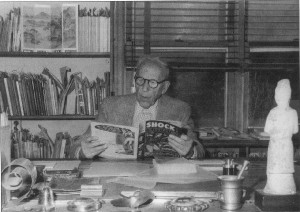
These are smart people and if you think you’re entitled to geek status, these people not only know their comics and love them but can also place them within the context of history and culture. And if your second thought is—oh librarians, and yawn…dull—far from it. Carol is not only smart and funny, uses lots of interesting visuals but her talks are also lively and thought provoking.
In looking at what we’ve lost Carol pointed out that in the early 1950’s about 95% of elementary age kids were reading comics. Teens and adults were also reading comics. From the moment comics arrived on the scene in the early 1930’s kids loved them and the titles proliferated. Once Superman started throwing villains and automobiles around the number of genres and titles became prolific. After World War II comics became more mature and there were 600 new titles in a decade. That’s a lot of comics.
Wertham’s campaign against comics was part of the death knell that led to the much smaller percentage of kids reading comics today. Comparing the smaller percentage of 7 million in sales today to over 1 billion in the early 1950’s tells the tale. That the prejudice against comics led to the reduced readership is important for everyone in the industry to understand.
Carol not only has done research in the usual avenues but has also researched specific teenagers from that period who responded to Dr. Wertham’s message of anti-comics. She gave some fascinating examples of kids crusading against racial stereotypes and a young woman who set up a lending library for comics during this period as well as the cogent arguments presented by teens who wrote to Dr. Wertham in response. Carol pointed out that social media is nothing new since comics have long supported social media through the fan letters printed in comic books.

One of the major results of Carol’s scholarship and research is the fact that Wertham fabricated some of his statistics in his zeal to eradicate comics. In other words there was no necessity for the Comics Code, which was in existence until 2011.
From the very beginning of comic books librarians used the image of Superman urging kids to read. Today’s librarians celebrate comics because they encourage children to read. This is one of the basic foundations of the inception of early comics. Carol’s challenge to the librarians in the group was to point out that in the Wertham scare the ALA did nothing and to ask them what would they do if something similar to the Wertham campaign happened today? Who says comics are silly and shallow—not in this panel.


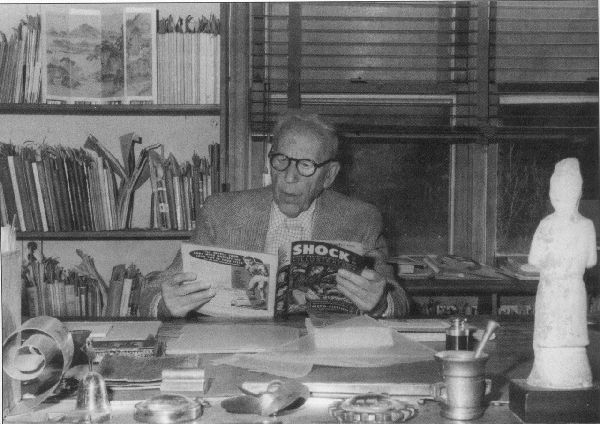
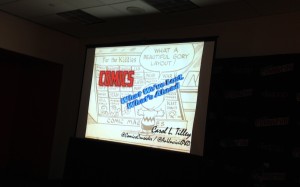
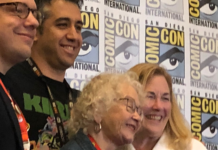
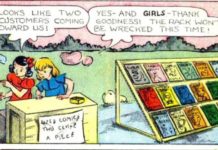




Calvin Reid conducted an interesting interview with her after the talk on the More to Come podcast :
http://www.publishersweekly.com/pw/podcasts/index.html?channel=2&podcast=313
Can anyone please provide any info / feedback based on this article regarding how comics pre-Wertham/Comics Code, were changed; how sequential media for comics was restrained/changed/maybe in some ways enhanced -or no enhancements in any way; comics were just f*(^d…???
I really need to know, because I think maybe we should bring that back,…??? There is sequential media, and then there is “comics”, and I would really not mind it if there was more sequential media in today’s “comics”. “Comics” as in the ‘American’ version which is dominated by superheroes, -maybe as opposed to the manga type / brand of comics that actually dominates the sequential media sales world wide, no?
So hey, any feedback / input would help! Thank you!
That’s a huge question and requires a lot more than a mere reply on a blog. Here’s a start: Check out this article from the New York Times which will give you a bit of a response to your question. http://www.nytimes.com/2013/02/20/books/flaws-found-in-fredric-werthams-comic-book-studies.html?pagewanted=all
I would also suggest David Hadju’s book The Ten Cent Plague and Dr. John Lent’s book Pulp Demons.
Wertham did a lot of damage, alright, but he didn’t do it alone. He found a sympathetic and supportive audience for his crusade. He must have been a charismatic speaker to be able to ignite that amount of alarmist collusion.
I think there’s a lot more context to the Wertham situation: The U.S. were also in the midst of a lot of societal upheaval: McCarthyism, Civil Rights, Masters and Johnson, Birth of Television..there were a lot of paranoid people in all the right places at the right moment. Comics publishers rolled over and that’s pretty much the short and sweet of it. Tilley makes a great point that the ALA did nothing to defend comics during the upheaval but then again, the ALA’s defense of freedom of speech is something that evolved not long after the creation of the Comics Code.
The biggest redeeming factor of the ALA is that they have had an amazing impact on the graphic novel category. There are now three or four generations of librarians who have defended the idea of shelving comics/graphic novels. They can argue the value of comics as literature better than just about anyone you might ever meet. The growth of the graphic novel category is a direct benefit of the efforts of the ‘new generation’ librarians.
It’s interesting to speculate what might have happened if comics publishers had not capitulated. I don’t imagine that the government really wanted to step in and become involved in comic book pre-censorship. Yet by forming the Comics Code– even though some publishers probably had ulterior motives in so doing– the industry defanged the anti-comics movement. I don’t think anyone in the mainstream industry had the genius necessary to have promoted the medium as a venue for adult entertainment. IMO the American medium had to go through an “adolescence,” in the form of the Silver Age, before it could “grow up.”
I appreciate the conversation Nicky’s write-up is spurring. As John S. notes, the context that explains comics’ readership decline and the American Library Association’s lack of anti-censorship advocacy in the 1950s is complex and convoluted. In a 35-minute talk, it’s difficult to be nuanced, so I aimed for provocative. For those of you who are bored, you can take a look at my 2007 dissertation “Of Nightingales and Supermen” on Google to see more about librarians and comics in the pre-code years. I touch on some of these issues in my other writings too. Librarians – as a whole – are amazing, passionate advocates for comics, and I’ve had the privilege of teaching and talking to many of them over the past 15+ years.
Comments are closed.